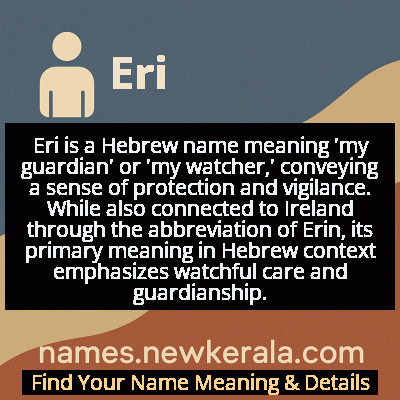Eri Name Meaning & Details
Origin, Popularity, Numerology Analysis & Name Meaning of Eri
Discover the origin, meaning, and cultural significance of the name ERI. Delve into its historical roots and explore the lasting impact it has had on communities and traditions.
Name
Eri
Gender
Male
Origin
Hebrew
Lucky Number
5
Meaning of the Name - Eri
Eri is a Hebrew name meaning 'my guardian' or 'my watcher,' conveying a sense of protection and vigilance. While also connected to Ireland through the abbreviation of Erin, its primary meaning in Hebrew context emphasizes watchful care and guardianship.
Eri - Complete Numerology Analysis
Your Numerology Number
Based on Pythagorean Numerology System
Ruling Planet
Mercury
Positive Nature
Adventurous, dynamic, curious, and social.
Negative Traits
Restless, impatient, inconsistent, prone to indulgence.
Lucky Colours
Green, white.
Lucky Days
Wednesday.
Lucky Stones
Emerald.
Harmony Numbers
1, 3, 9.
Best Suited Professions
Sales, marketing, travel, entertainment.
What People Like About You
Versatility, charisma, adventurous spirit.
Famous People Named Eri
Eri Watanabe
Actor
Japanese actor known for roles in international films and television series
Eri Nitta
Singer
Japanese pop singer and actress, member of the idol group Onyanko Club
Eri Klas
Conductor
Estonian conductor who led numerous international orchestras and opera productions
Eri Kitamura
Voice Actress
Japanese voice actress and singer known for roles in popular anime series
Name Variations & International Equivalents
Click on blue names to explore their detailed meanings. Gray names with will be available soon.
Cultural & Historical Significance
In Japanese culture, Eri is a common feminine given name meaning 'blessed prize' or 'excellent profit,' though it can also be used for males in certain contexts. The name has gained international recognition through Japanese media and entertainment. Additionally, in some African traditions, particularly among the Igbo people of Nigeria, Eri is considered a foundational ancestral figure, believed to be the progenitor of the Igbo people and a cultural hero who established important societal structures.
The name's connection to Ireland through the abbreviation of 'Erin' adds another layer of cultural significance, representing the poetic and romantic vision of Ireland as the 'Emerald Isle.' This multifaceted cultural heritage makes Eri a name that bridges continents and traditions, embodying both specific cultural identities and universal human values of protection, heritage, and cultural pride.
Extended Personality Analysis
Individuals named Eri are often perceived as protective, observant, and deeply intuitive. The Hebrew meaning of 'my guardian' suggests someone who naturally takes on protective roles, whether for family, friends, or community. They tend to be watchful and perceptive, noticing details others might miss, which makes them excellent problem-solvers and trusted advisors. Their guardian nature often manifests as loyalty and reliability in relationships.
Eri's personality typically combines analytical thinking with emotional intelligence. They balance practical observation with compassionate understanding, making them effective mediators and leaders. Many Eris demonstrate artistic or creative talents, particularly in cultures where the name is associated with blessing or excellence. They often possess a quiet strength and determination, preferring to lead through example rather than loud authority, and they value deep, meaningful connections over superficial relationships.
This combination of traits makes Eris particularly suited to careers in counseling, education, healthcare, or creative fields where their protective nature and observational skills can flourish. Their multicultural name origins often translate into an appreciation for diversity and cross-cultural understanding, making them effective in international or multicultural environments. The name's various cultural meanings contribute to a personality that is both grounded in tradition and open to new experiences.
Modern Usage & Popularity
In contemporary usage, Eri maintains its multicultural appeal while adapting to modern naming trends. The name has seen steady usage in Japan, where it remains a popular choice for both genders, though more commonly female. In Western countries, Eri is often chosen by parents seeking a short, international name with deep cultural roots. The name's simplicity and easy pronunciation across languages contribute to its global appeal. Recent years have seen increased interest in the name through exposure in anime and manga, introducing it to new audiences worldwide. While not among the most popular names in English-speaking countries, it maintains a consistent presence as a distinctive choice that bridges multiple cultural traditions. The name's versatility allows it to fit well in professional, academic, and creative contexts, making it a practical choice for parents considering their child's future in an increasingly globalized world.
Symbolic & Spiritual Meanings
Symbolically, Eri represents protection, vigilance, and cultural bridging. The Hebrew meaning of 'my guardian' evokes images of watchfulness and protective care, suggesting someone who serves as a safeguard for others. This symbolism extends to spiritual protection and guidance in many traditions. The name also carries connotations of blessing and excellence in Japanese context, representing both divine favor and human achievement. As a name that crosses cultural boundaries, Eri symbolizes the ability to maintain cultural identity while embracing global connections. It represents the modern ideal of multicultural understanding and the preservation of traditional values in contemporary society. The name's brevity and simplicity further symbolize clarity, directness, and essential truth, while its multiple cultural origins represent the richness that comes from diverse heritage and the universal human experiences of protection, care, and cultural pride that transcend geographical boundaries.

